Back in 2018, I found myself amidst a diverse group of professionals, sharing insights and knowledge as a speaker at the very first Testing United conference in Bratislava. It was an experience that left a lasting impression on me, fostering a deep connection with the community that gathers at this unique event annually. It feels almost like coming full circle as I found myself being invited to attend this year’s iteration.
The central theme this time was – “Tester’s Place in Universe, Metaverse & Beyond” and it promised interesting talks and discussions. It wasn’t just the allure of the subject matter that drew me in; it was the promise of reconnecting with peers, engaging in thoughtful discussions, and perhaps stumbling upon fresh perspectives in the realm of testing.
Travelling to Bratislava
Traveling to Bratislava, the charming capital nestled by the river Danube, was nothing short of a visual treat. As the train sliced through picturesque landscapes, I couldn’t help but feel a wave of anticipation mixed with a sense of serenity. The journey was a gentle reminder to slow down and soak in the beauty that unfolds en route to one’s destination. Much better then driving.
Upon arrival, I was greeted by the embracing warmth of the sunny weather, a perfect complement to the vibrant energy that Bratislava always seems to radiate. Before diving into the intellectual rigor of the conference, I took a moment to immerse myself in the city’s beauty, indulging in a little sightseeing that offered both historical richness and modern allure.
As the day gently transitioned into evening, I found myself at a cozy bar nestled near the Danube, a place where the city’s pulse could be felt in its purest form. With an Aperol in hand, a refreshing blend of sweetness and bitterness dancing on my palate, I could feel the day’s fatigue melting away. Adding to the relaxation was the hookah that wafted a fragrant cloud, mingling with the evening air and adding a note of tranquility to the setting.
AI, AI, AI… So what?
AI was the most frequent word during the whole conference. So even the intro of this blog post was generated by ChatGPT – you can probably easily recognize it.
So what? I think AI is a huge opportunity that will affect our jobs as Testers, QAs and it is going to be in a positive way. We should not be scared, we should be thrilled.
The rest of the blog is a summary of each talk I participated and as always it is a mix of speaker ideas and my opinions. I also decided to include screenshots of my original notes even though I have small doubts anybody else can read them…
Rik Marselis – Four tips for testers in the universe, metaverse or beyond to end unstructured testing
The main idea of this keynote was that structured testing brings more value than instructed, it is more effective, etc. In general, it makes sense, however, I still think we should use both because sometimes too much structure is just too much structure.

The first interesting question to the audience was who often uses the error guessing technique. Many of us, including me, raised our hands. Rik pointed down that error guessing is one of the most unstructured techniques, it is very intuitive and ad-hoc. I agree. I also agree it works best when quality is lower and it is more effective there. So basically it means, that error guessing is not a wrong technique, it is powerful in a given context, but could be a big waste of time in other contexts when you would not find anything relevant or important using this technique. So it is as with any other tool, it is just a tool.
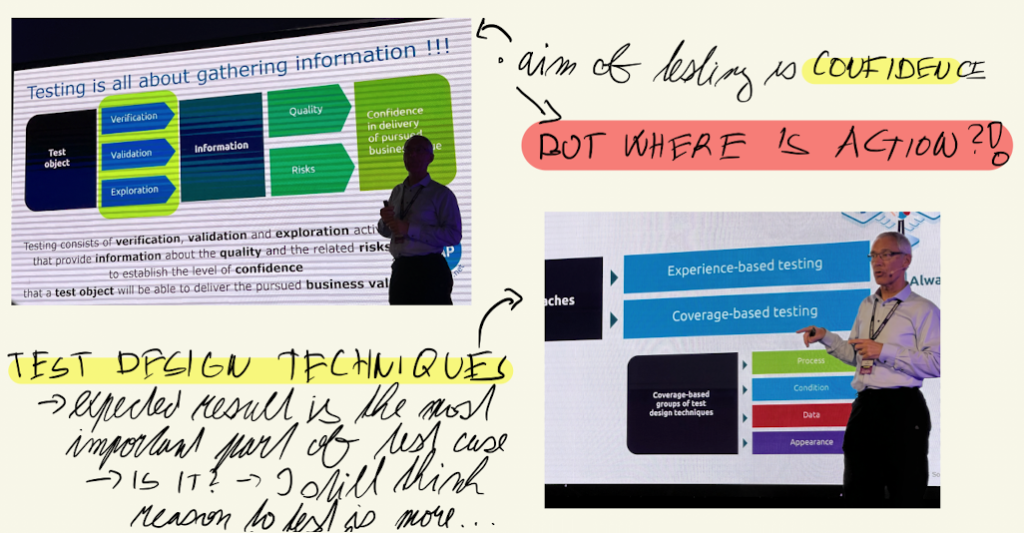
The next topic I loved in Rik’s presentation was visualization and the definition of testing. There are dozens of these and this one is very close to my understanding of what testing is. Very nice, I need to buy your new book Rik 🙂
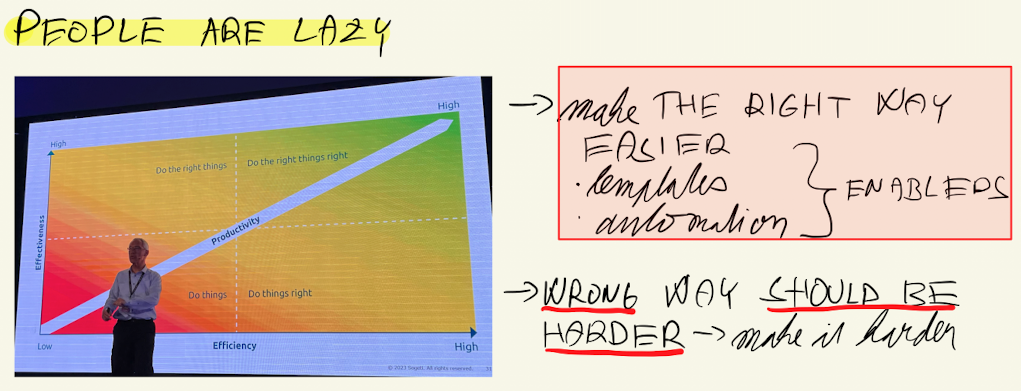
This chart about productivity is very interesting in my current context. Why? Because we are in the transformation phase and new and correct approaches are harder to do and because people are naturally lazy (in a good way) it is important to know that the goal is the right way should be the easier way. So maybe I should think about how to show that the old way is at the end harder, show its risks, consequences, etc.
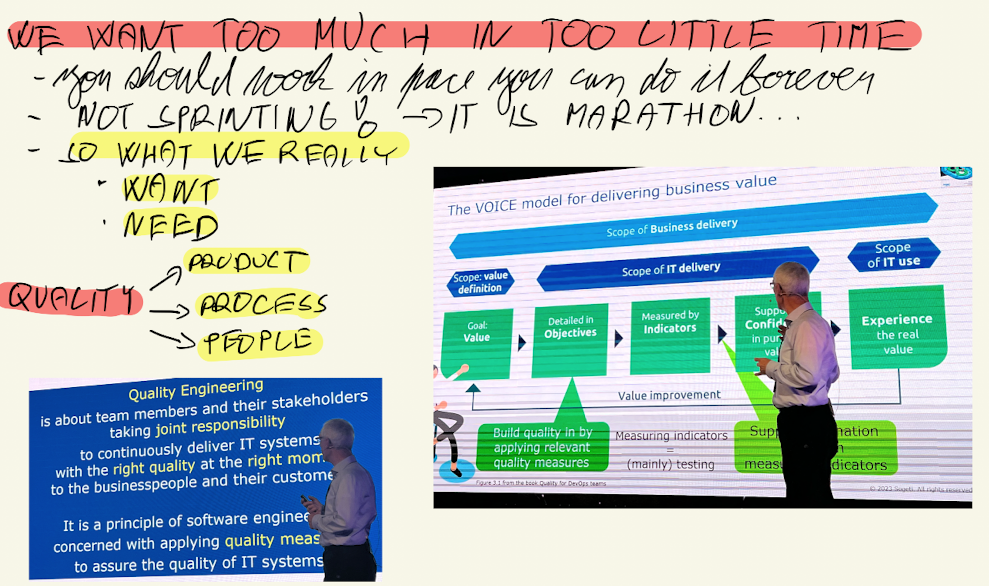
What to add for this picture? It is self-descriptive. Just always remember – testing is the measure.
I really enjoyed this opening keynote, it was a combination of a few new ideas and confirmation of the opinion. I definitely agree AI is and will be a good co-pilot for testers, but it is not ready to be auto-pilot yet and it will not be soon.
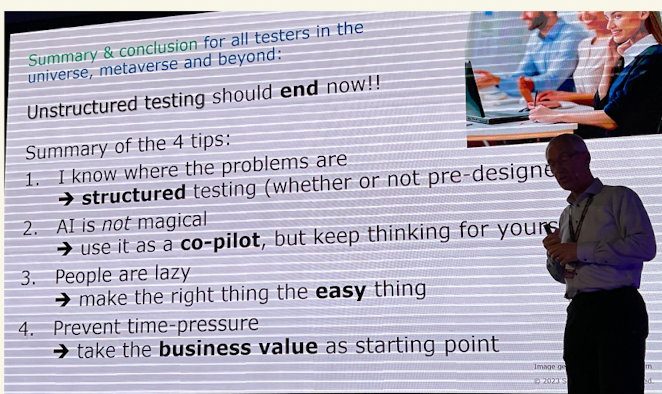
Filip Hric – Testing tips (live coding session)
Test Automation is not my piece of cake. The concept of life session is interesting but I was often disturbed by too many windows switching, blinking, etc.
One interesting thing I want to check with our QAs is if, where, and how are we using waiting for API requests.
Also tool called Replay.io sounds worth trying.
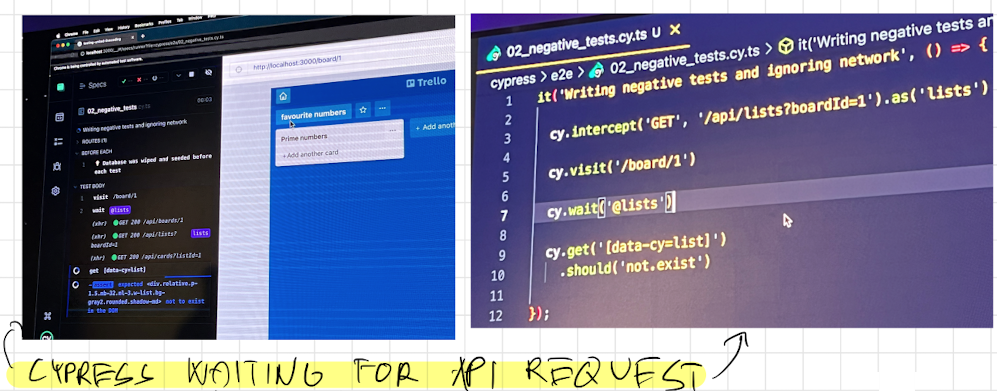
Panel discussion with keynote speakers
Panel discussion was great. It was one of the best parts of the entire conference.
It started with Boris saying “Let the fight begin”
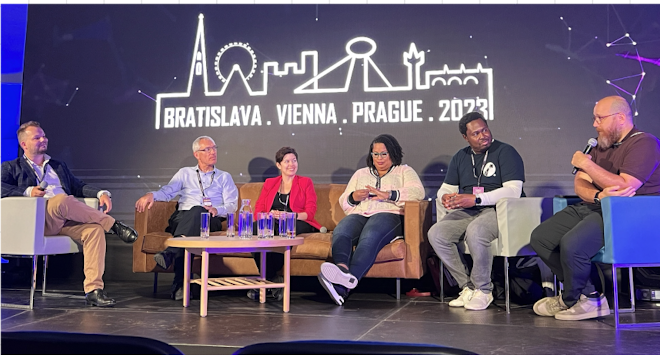
Mix the speakers was good for discussion and it was also a lot of fun.

This is really great question. Responsibility should be on one side. So far it is our side, but what about the future? Will there ever be a point when AI will be self-responsible and accountable? And what do these terms even mean in the context of software?
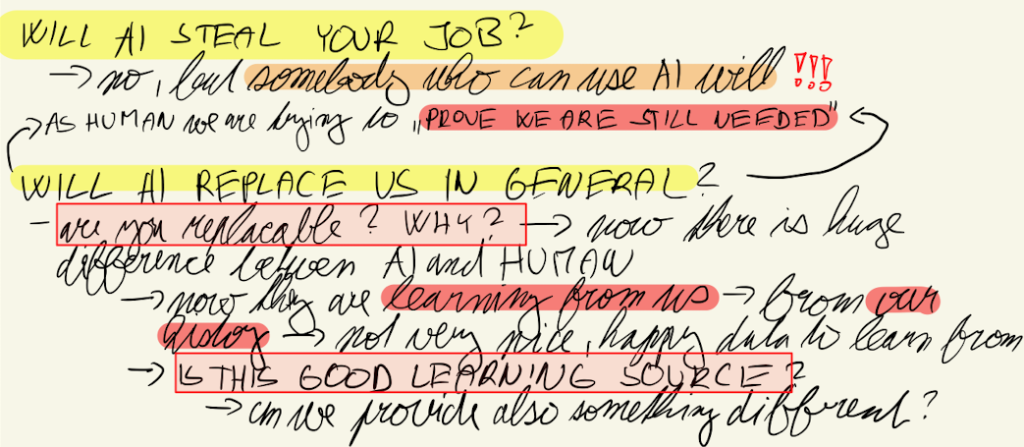

This question is at every conference and it is even not a new one. Will machines steal our jobs? No, if your job is worth to be done by humans. If not, if your current job does not make sense to be done by humans anymore, so what? Be at home with your kids or find a different job.

Interesting, this will be more and more important and I believe this is an area and new possible responsibility for testers. We are used to asking Whys, seeking for business needs, value, and purpose. Maybe, I hope, in the future one of our new responsibilities will be asking not only “Why?” but also “Should we?”

Finally, one question that was from a different bucket than AI. Do we still need testers? Dedicated one? That is a big dilemma. Testing should not be a role, it is an activity. Even if it cannot be achieved by the testers themself, testing and quality need to be shared and owned by the whole team. However, I truly believe the benefit of dedicated tester(s) is that we really care, it is our passion our commitment, and our love. Nobody else has the same attitude.

Tariq King – Generative AI for Software Productivity: Hype or Hyper-Acceleration?
This talk was quite general. I liked the visualization of what Productivity is and a few other ideas.
- Uncertainties in areas of security and intellectual properties when using large language models
- Wrong input results in the wrong answers. Correct inputs do not guarantee the right answers
- The result could look correct to the untrained eye – especially code.
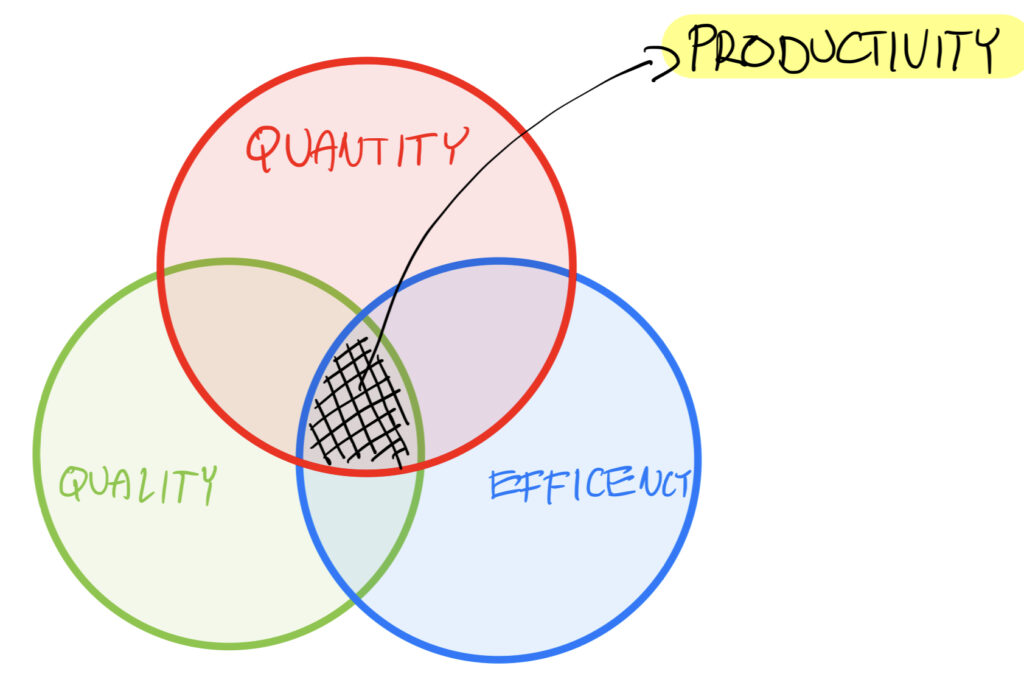
Vernon Richards – How I Think Quality Engineering, Glue Work And Quiet Quitting Are Related and what we can do about it!
A lot of words about one very important idea – a lot of work is not visible, and nobody is directly responsible for it, but when not done it sucks. Vernon calls this “Glue work” because it keeps the team together.
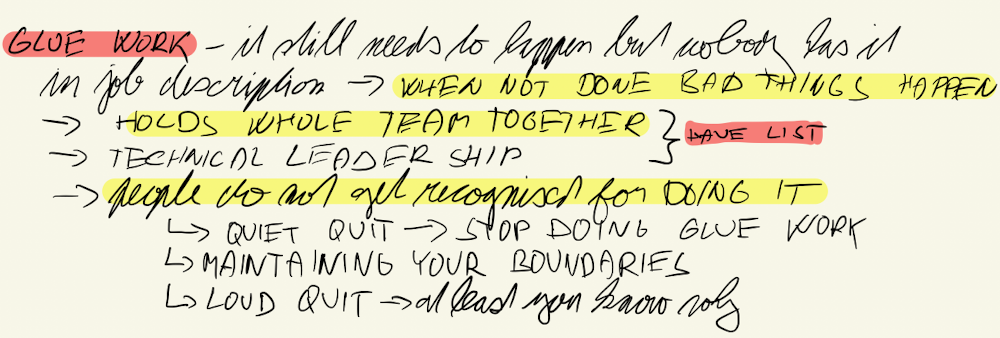
One more thing, there was an interesting definition of quality as an “organizational pattern of how to respond to a quality problem or topic”.
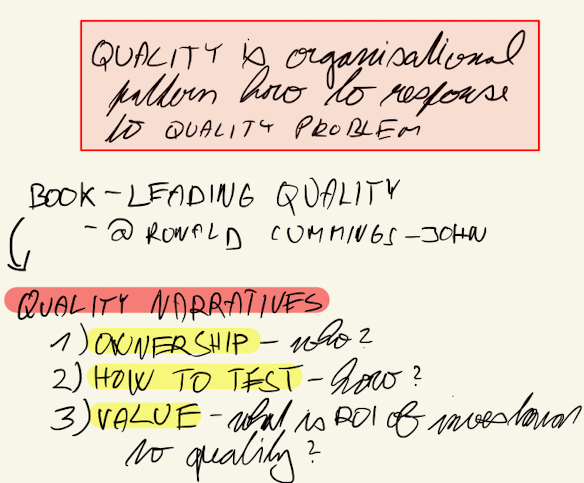
Barış Sarıalioğlu – Why Is Test Automation Still Manual and How Can We Make It Really Automated?
I really enjoyed Boris during the panel discussion on the first day so I was really looking forward to his keynote. I expected something different – a practical talk. It was exactly the opposite – a theoretical one. But good one.
Boris started with Kahoot survey asking some interesting questions and commenting results.
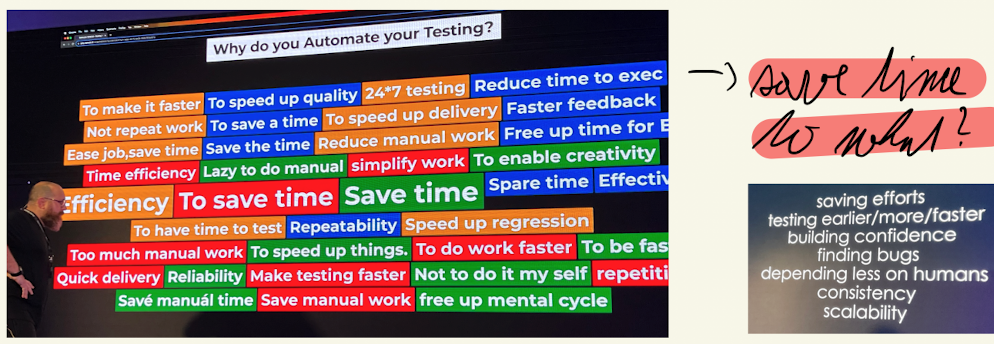
Clear answer to me “To have time to test” – yes it saves time but if we do not use that gained time then not a big benefit.
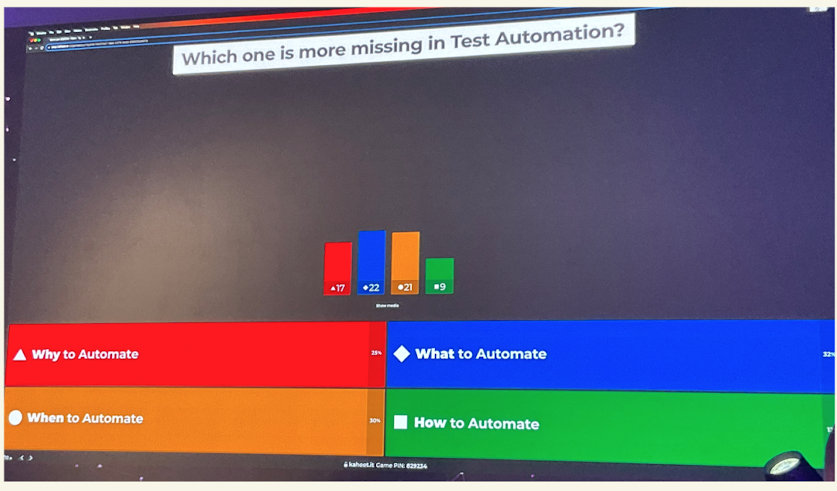
This distribution shows that we still have a lot of problems with automation. For me, the order is Why -> What -> When -> How
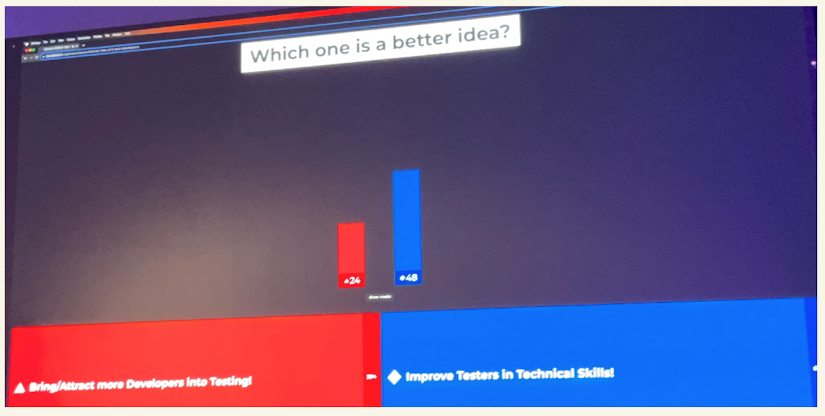
If you ask this question at a testing conference you usually get this result. What if you ask the same one at the dev conference? However, there is on huge risk “If everybody wants to automate nobody wants to test “manually” anymore“.

Automation is still just scraping the surface of testing and there are many more opportunities
Test Automation Manifesto – Boris took us through his manifesto which consists of 6 core values + 10 principles. Nice breakdown.

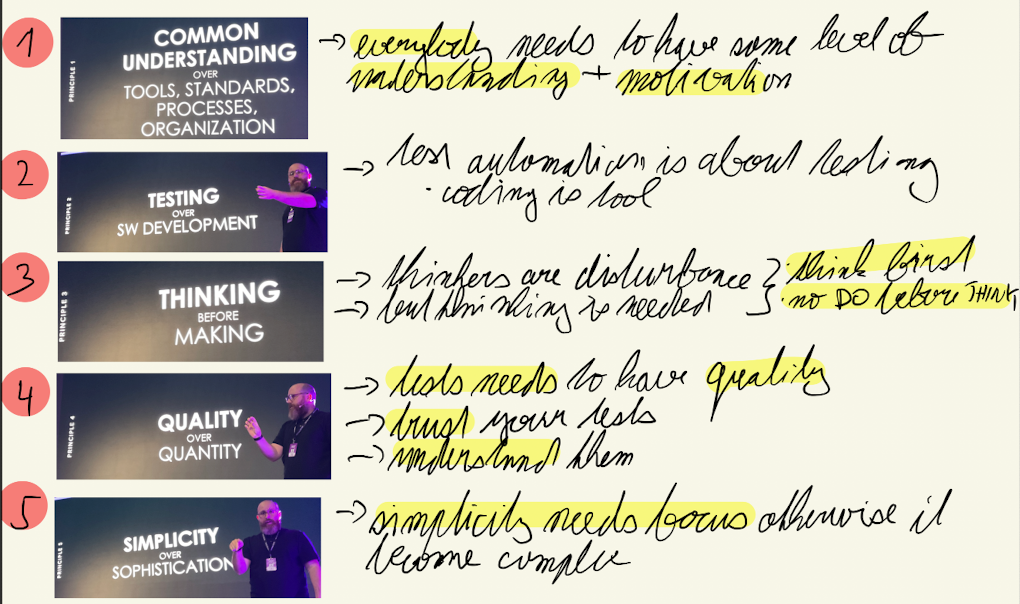
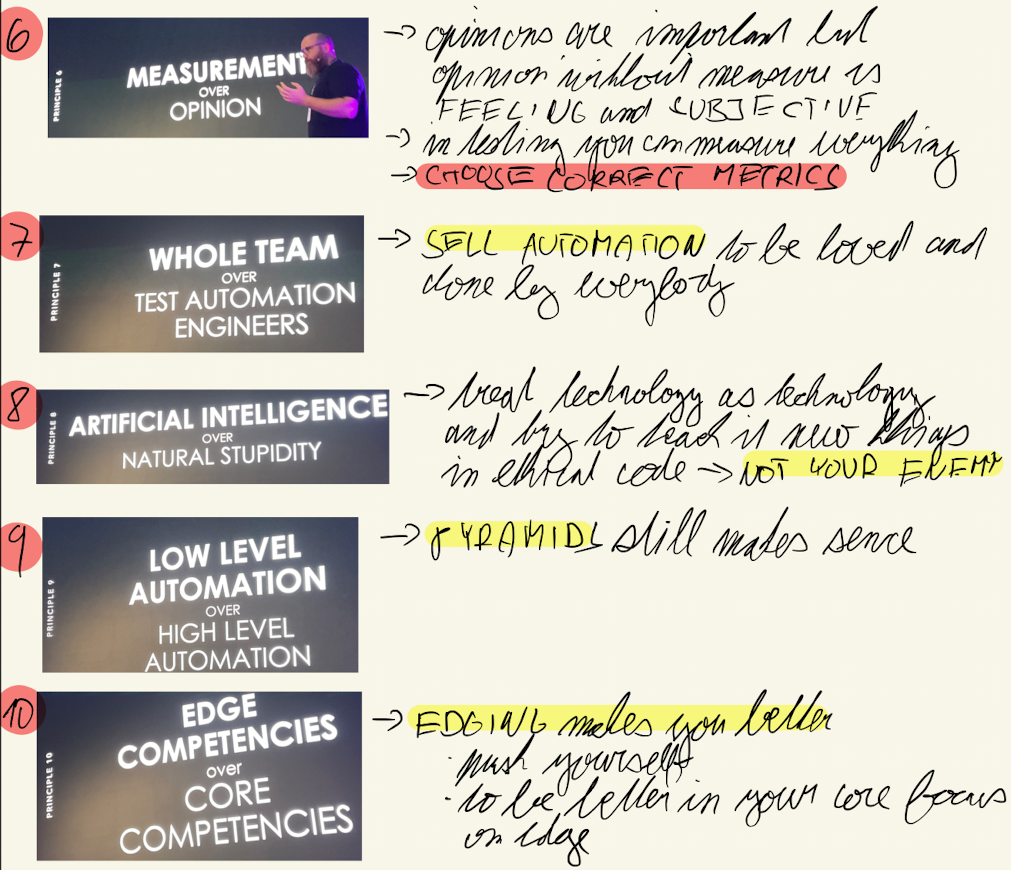
Ben Linders – Improving your testing with gamification
I like the idea of playing games to learn and discover. Ben presented some of his games and I think some of them are worth trying.
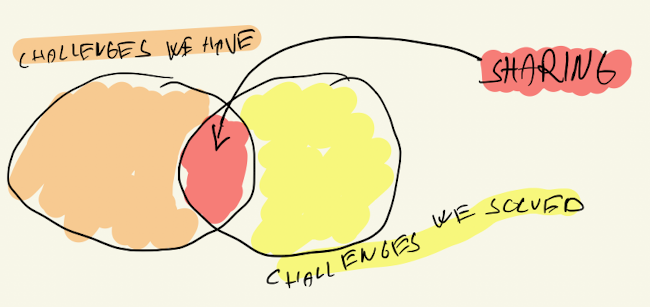
Erika Chestnut – Overcoming the Lack of Quality Culture
I was expecting some deeper practical sharing but this talk was very general about the need to visualise outcomes. Interesting was the opinion that Innovation may be the thing that blocks quality.

Rene van Veldhuijzen – Forget Shift Left and Shift Right. Let’s Shift Back
Very controversial headline of the talk – but I did not find anything related to this topic in the talk. It was a generic talk about why to automate to understand the need.
I liked the idea “we use other’s software we trust to test our software we do not trust”
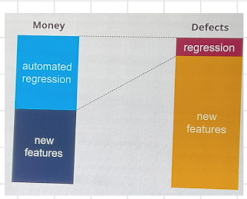
Irina Malgina – Who’s the masked tester?
I like to have a few talks about soft-skills or psychological topics at every conference but this one was so generic without concrete examples and how to deal with them.

Kinga Witko – Respect. Support. Connect. Team guide to mindfulness
The closing keynote was also about psychological well-being but this time I really liked it. It was natural, with a lot of examples and positive energy. Very well-chosen closing keynote.
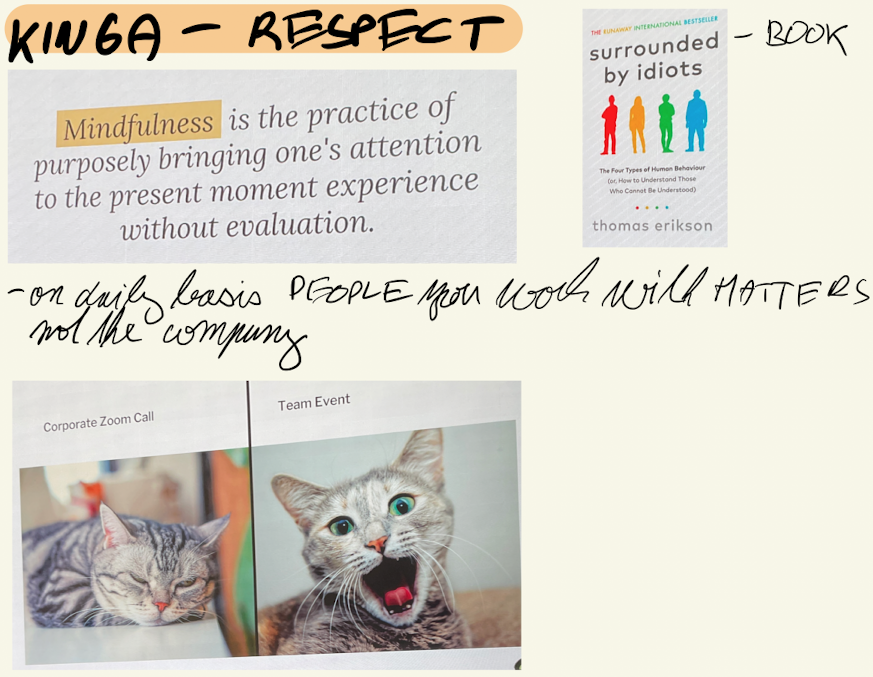
Closing words
Thank you for inviting me, I enjoyed it and met some old colleagues and friends.










